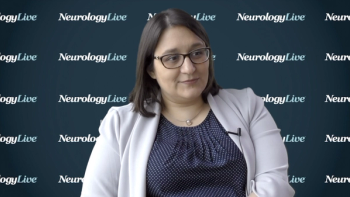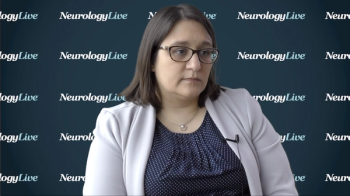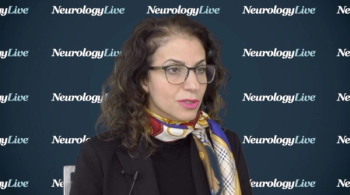
New study data showed nerve ultrasound had a sensitivity of 97.4% and specificity of 78.9%, with an added value in the detection of treatment-responsive chronic inflammatory neuropathy of 21.1%.

New study data showed nerve ultrasound had a sensitivity of 97.4% and specificity of 78.9%, with an added value in the detection of treatment-responsive chronic inflammatory neuropathy of 21.1%.

Seizure-free patients experienced similar rates of graduation and employment following epilepsy surgery compared to the general population.

The president of the American Epilepsy Society and director of epilepsy research at Brigham and Women’s Hospital outlined the state of epilepsy care and what we can expect in 2020.

Those taking the drug achieved a significant reduction in the risk of stroke and death after acute ischemic stroke or transient ischemic attack when coupling it with aspirin.

The director of the Pediatric Epilepsy Program is joined by an MD candidate from Weill Cornell Medicine to discuss the protocol used to treat patients with status epilepticus.

Findings from a study revealed that 50% of strokes in adolescents remained cryptogenic, sparking the need for multidisciplinary collaboration on prevention and management.

Retrospective study data suggest that among women aged 13 to 50 years with idiopathic generalized epilepsy, avoiding valproate resulted in a higher likelihood of unsatisfactory seizure control.

The Infinity DBS system is the only directional DBS system approved to target all major areas associated with movement disorders, including Parkinson disease and essential tremor.

The phase 2 clinical trial of CAD-1883 will assess the efficacy and safety of the drug compared to placebo.

Neurology News Network for the week ending January 27, 2020.

Take 5 minutes to catch up on NeurologyLive's highlights from the week ending January 24, 2020.

The epilepsy fellow at the hospital of the University of Pennsylvania detailed why locating the seizure onset zone plays a crucial role in successful epilepsy surgery.

Caregivers who care for children with frequent seizures experienced the greatest economic deficit, begging the question whether epilepsy interventions should be weighed based on cost/benefit.

Subgroups and treatment-related changes can be identified with comparative cerebrospinal fluid proteomic analysis in adult patients with spinal muscular atrophy who are treated with nusinersen.

A systematic review of 9 studies suggested that pretreatment with dual antiplatelet therapy is not associated with a higher risk of poor outcomes after intravenous thrombolysis.

The first trial of its kind in amyotrophic lateral sclerosis will first examine 3 drugs and add additional treatments as more become available.

Part 2 of the pivotal FIREFISH clinical trial met its primary end point in infants aged 1 to 7 months with Type 1 spinal muscular atrophy, with statistically significant and medically meaningful motor milestone improvements.

The associate professor of neurology and director of the Women With Epilepsy Program at Northwestern University Feinberg School of Medicine detailed the ongoing questions about assessing the gaps in breastfeeding between women with, and without, epilepsy.

The Headaterm TENS device was shown to decrease pain at an 11.8% better rate than many acute migraine medications used in the emergency department in randomized trials, with data suggesting it is both effective and fast-acting.

The novel oxybate agent has been submitted as an investigational treatment for cataplexy and excessive daytime sleepiness in those ages 7 years and older with narcolepsy.

The drug proved effective in extending total sleep time over a 4-week study period, with minimal adverse events observed.

The associate professor of neurology and director of the Women With Epilepsy Program at Northwestern University Feinberg School of Medicine spoke about the findings of the MONEAD study and their implications for women with epilepsy.

The medical director of the Comprehensive Epilepsy Clinic at Nicklaus Children’s Hospital shared his insight into the potential of using an SCN1A-targeted adeno-associated viral vector-based gene therapy in epilepsy.

Findings from the small-scale study showed that the drug had target engagement with β-glucocerebrosidase as well as cerebrospinal fluid penetration.

The associate professor of neurology and director of the Women With Epilepsy Program at Northwestern University Feinberg School of Medicine spoke about the need for consistency in the messaging conveyed to women with epilepsy who are having children.

Those who have strokes with favorable imaging profiles have a higher likelihood of receiving endovascular thrombectomy as well as achieving high functional independence rates after 90 days.

Findings from a large scale analysis show higher rates of cognitive impairment and neuropsychiatric disturbances in patients with parkinsonism-dominant motor-manifest individuals.

Danielle B. Cross, MD, MS, a neurology resident in training, shares her thoughts on the importance of humility in medicine.

As was the case for siponimod’s FDA approval in March 2019, this regulatory decision by the European Commission for the selective sphingosine-1-phosphate receptor modulator was based on the phase 3 EXPAND trial.

The professor of neurology and epilepsy specialist at the Cleveland Clinic Lerner College of Medicine explains the decision-making process surrounding epilepsy surgery.